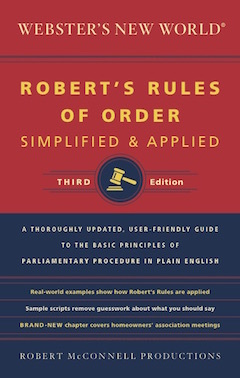Voting in HOAs: Corporate not Democratic
By Deborah Goonan
What would you say if I told you that your neighbor voted for the Mayor of your city seven times in the last election? Or what if the owner of the apartment high rise downtown got 240 votes at the polls? Suppose there was a controversial referendum on the ballot, and lots of wealthy property owners got to cast one vote for each property they owned?
Chances are you would be indignant, as you should be.
But this is exactly the process used to elect your HOA Board of Directors – well, when there actually is an election – and how changes are made to your HOA CC&Rs (Covenants, Conditions & Restrictions), all those rules you must follow, or else.
Although your HOA may seem like local government, with the power to enforce penalties for various violations large and small, the fact is, your HOA is a legal corporation and not officially a government.Therefore, the corporate voting model is used, where votes are allocated per share of ownership in the HOA. Votes are typically allocated in one of two ways. Each property owned, whether a house or a lot, represents one share of the HOA, and gives the right to one vote. Each property owned, usually a condominium, is allocated proportional votes based upon the size of the unit.
There is a special exception if you happen to be the Developer. In that case you have weighted votes – anywhere from three to nine votes per unit or lot owned – during the time of construction and sale of homes. (Not that it matters for elections, because during Developer control, the Board is appointed, not elected. But it still matters for amendments to the CC&Rs.)
Keep in mind that it doesn’t matter how many people live in your house, you still get only one vote, as long as you’re the owner. If you’re a tenant, you probably don’t get to vote at all, unless the HOA allows the owner to allocate his or her vote to a tenant.
What if a real estate investor purchases 40 homes or condos in your HOA? She gets 40 votes, one for each property, of course. It doesn’t matter if she doesn’t actually live in the community, or if she’s an absentee landlord that doesn’t even manage her properties or monitor her tenants (other than to collect rent). She still gets 40 votes to your measly one vote.
As for your next-door neighbor that is behind on his assessments due to unforeseen medical bills, and the neighbor down the street that hasn’t paid a fine for that stubborn brown spot in his lawn: their votes will probably not be counted, because they owe money to the Association. Never mind that the poll tax was declared unconstitutional in 1964, with the ratification of the 24th amendment, because corporations do not necessarily have to guarantee shareholders Constitutional protections.
How might this lopsided allocation of voting rights affect your next Board election? Now imagine what will happen when the Board wants to relax rental restrictions. Who has more votes in your HOA – the full-time owner-residents or the bulk buying landlord-investors?
A brief review of American history: When America was founded in 1776, only landowners had the right to vote. By and large, voters happened to be white, male, and Protestant. Of course, after more than 200 years marked by a Civil War, Women’s Suffrage and Civil Rights movements, it’s much different today – except in your HOA. And even in 1776, each landowner only had one vote.
